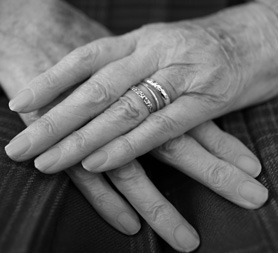NHS figures predict dementia timebomb
 Victoria Macdonald
Health and Social Care Editor
Victoria Macdonald
Health and Social Care Editor
Exclusive: A comprehensive NHS review finds dementia cases are expected to rise by 72 per cent over the next 20 years, posing a serious burden for future care services, writes Victoria Macdonald.
- Chapters
- descriptions off, selected
- subtitles off, selected
- captions settings, opens captions settings dialog
- captions off, selected
This is a modal window.
This is a modal window. This modal can be closed by pressing the Escape key or activating the close button.

The cruelty of dementia is thrown into stark relief with the publication of a report showing how many develop the mental illnesses and how many more will succumb to it by 2030.
Produced by the National End of Life Care Intelligence Network, which is part of the NHS, it says there will be “particular challenges” for care homes as they respond to the inevitable rise of dementia, Alzheimer’s and senility.
The report is the first of its kind to try and draw together the picture of what will happen as society ages.
It shows, for instance, that 59 per cent of people with one of the three conditions will die in a nursing or residential home compared to 32 per cent in hospital. Yet for the rest of the population 58 per cent will die in hospital and only 16 per cent in care homes.
And this did not seem to change regardless of whether the person has cardiovascular disease, cancer or respiratory illness. The report’s authors say that these findings alone show how important planning and educating staff in care homes will be in the coming decades.
Between now and 2030 there will be a predicted 72 per cent rise in people over the age of 65 diagnosed with dementia.
Stark rise
The figures are stark. They show that between now and 2030 there will be a predicted 72 per cent rise in people over the age of 65 diagnosed with dementia in England to just over 1 million.
And some regions will be far worse than others. In the East Midlands the rise will be 84 per cent. While in the North West it is predicted to rise by 66 per cent.
The London increase is the lowest – at 44 per cent – largely because, once, people in the Midlands or the North might have succumbed earlier to heart or lung disease or cancer. Now, with better health care, they are living longer – only to develop dementia.
The Social Care Minister Paul Burstow said the Government was protecting dementia services.
“In the spending review we prioritised social care and announced an additional £2bn by 2014 and £1.3 next April – that was there to meet these demographic pressures of the ageing population and particularly dementia,” he said.

Cuts on the horizon
But this is all against a background of cuts, threats to care services and the increasing cost of nursing and residential homes – and he did not make it clear how this sits with local authorities having to make radical savings on their social care budgets.
There are some services that are making a difference.
Carole Brown’s mother died in February from heart problems and vascular dementia. Mrs Brown was still stunned by what she had gone through. Trying to find the right home, deal with who should be funding it, and fearing for her mother’s safety as she wandered at night.
Support
She was helped in the end by Morejoy Saineti, a dementia voice nurse, part of a project initially funded by the King’s Fund and now by Westminster Primary Care Trust.
“People with advanced dementia are often highly dependent with multiple nursing needs.” Dr Graham Stokes, Bupa
Working as part of the charity, Housing 21, Mrs Saineti supports people with dementia as they come to the end of their lives, as well as their families. She liaises between the multitude of services and local authority or NHS departments.
An evaluation of the first 19 months shows that more than £200,000 was saved by keeping patients out of hospital beds and nursing or care homes and not using ambulance services.
Dr Graham Stokes, Director of Dementia Care, Bupa Care Services told Channel 4 News: “People with advanced dementia are often highly dependent with multiple nursing needs which is why so many live their final days in care homes.
“We know that caring for people with dementia requires specialist training but this also applies to meeting everyone’s needs at the end of their life. It’s about finding ways of opening conversations with residents and relatives and then meeting their social, psychological and spiritual wishes as much as their medical needs.”